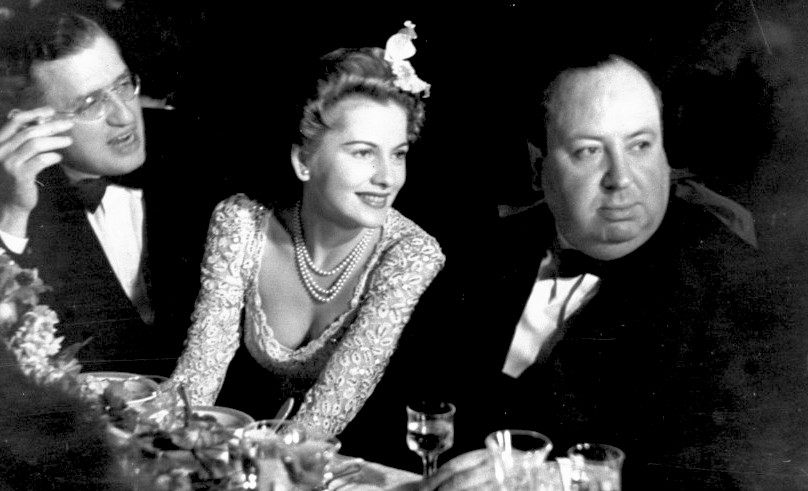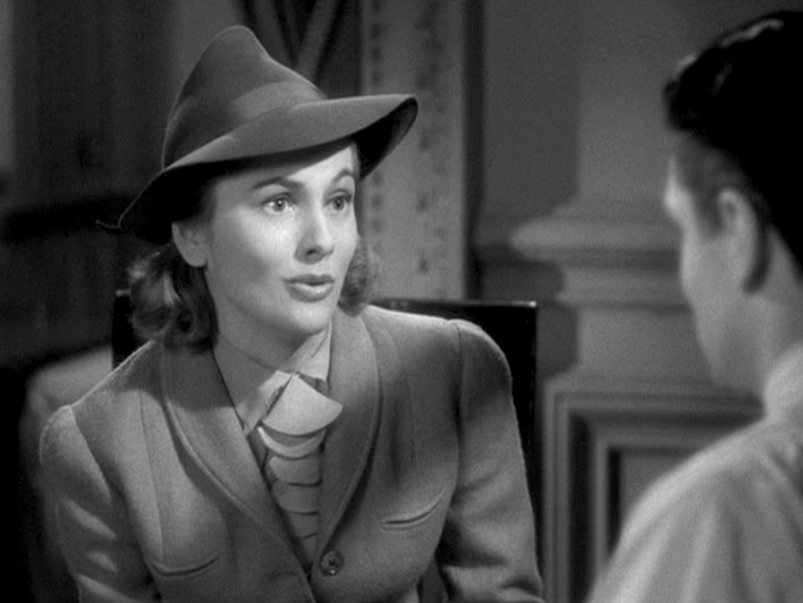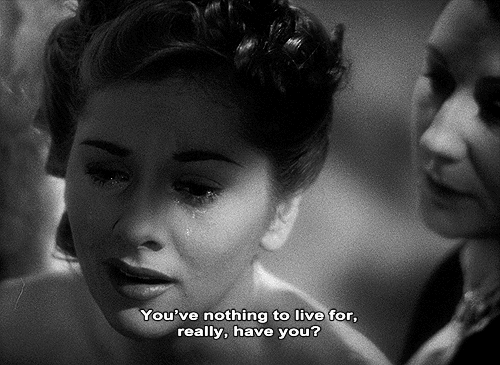Fontaine Centennial: Mrs de Winter in "Rebecca"
 Saturday, October 21, 2017 at 2:00PM
Saturday, October 21, 2017 at 2:00PM For the next few days we'll be celebrating Joan Fontaine's Centennial. Here's Eric on her most famous picture...
 David O. Selznick, Joan Fontaine, and Alfred Hitchcock at the Oscars for Rebecca. The film won... but Fontaine and Hitch didn't.
David O. Selznick, Joan Fontaine, and Alfred Hitchcock at the Oscars for Rebecca. The film won... but Fontaine and Hitch didn't.
One of the best things about writing for The Film Experience is the chance to open up windows of your film history you haven’t explored before. For some reason, throughout all the years, I had never seen a movie with Joan Fontaine. Just one of those black holes. And because she stopped acting before I was born, I have zero frame of reference for her (unlike, say, sister Olivia de Havilland)...
Fontaine stars in Alfred Hitchock’s 1940 Best Picture winner, Rebecca, and she’s a light (and alight, from within). She plays the new wife to rich baron Maxim de Winter (Laurence Olivier), who moves into his mansion Manderley, which is full of memories of Maxim’s first perfect wife, Rebecca. Fontaine’s character (no name is ever given) finds herself tortured by Manderley’s creepy housekeeper (played to the hilt by Judith Anderson) and the memories of her predecessor.

Rebecca remains ravishing, ridiculous, and compelling. Hitchock commits fully to the tale’s gothic flourishes, and the film is an excellent example of many early-Hollywood conventions (deep fades, rack focus, etc.) executed perfectly, with purpose and flair. He directs Olivier to deliver work both specific and ambiguous, filled with surprising comic touches and lovely melodramatic notes. I’m certain more than a few term papers must have been written about the lesbian overtones of Anderson’s character and performance… it all seems a little uneasy to watch in this day and age, but she’s in deep, and she’s fun to watch for sure.
But the movie belongs to Fontaine, and she’s quite touching. The first half hour of the picture lives almost in romantic comedy territory, and Olivier’s courtship of her allows Fontaine to lay the groundwork for a strong arc. Fontaine doesn’t overplay “everygirl” and she shows us her character’s shyness and awkwardness, as well as her fear that she’s not strong. She’s just “nice” which is what draws Olivier to her. But we see her character get smarter and tougher throughout the piece, in a gradual way that feels true. Fontaine has a light touch in the first portion of the picture, which becomes more effective when we see her turn on the darkness in the latter half. Her character becomes a full person during the course of the film, and Fontaine makes you root for her without being cloying.

Fontaine is also devastatingly beautiful in Rebecca, with a perfect movie-star face made for black and white photography. While her acting has some old-school extravagance to it, she’s never histrionic: there’s a purity to what she’s doing in the film, a clear love of her character and a smartly-calibrated journey. Seeing Fontaine for the first time in this film made me hungry to see more of her. Was this her best performance, or I am in store for even better treats ahead?



Reader Comments (8)
Oh, yes (to answer your first question), the very next year in fact (to answer your second). Suspicion, for which she won her Oscar. (Was this the first “make-up” Oscar? Hmm...)
I'd say the first makeup Oscar was probably Bette Davis' in 1935 for "Dangerous", but this was maybe the next?
Thanks for encapsulating what it is about Fontaine here and Anderson deserves a write up all of her own.
Fontaine was perfect for the role. She is specially good in her scenes with Judith Anderson who is terrifying
I do remember her more for 'Rebecca' than for 'Suspicion.' Seems like James Stewart took the 'make-up' Oscar for 1940. He's so invisible in 'The Philadelphia Story' compared to losing the prior year for 'Mr. Smith Goes to Washington.'
Fontaine deserved Oscars for both SUSPICION and REBECCA. :)
Great essay on a great gothic. You got to the heart of what makes Fontaine so right for this tricky role. It's terrible that her career didn't have more longevity.
Fine film though it is I'm not as crazy for Rebecca as most and it's far from my favorite Hitch film but Fontaine does a great job with I.
The search for her role was extensive with quite a few prominent actresses tested for the part, Margaret Sullavan, Anita Louise, Loretta Young and Vivien Leigh among them. Their screen tests were on YouTube at one time and are all fascinating for various reasons. Both Sullavan and Leigh were good but came across as too strong and self assured to make I work properly. Loretta Young was dreadful! It ended up coming down to Fontaine and a very young Anne Baxter and her youth ended up being the deciding factor though her test was the closest in spirit to what Fontaine brought to the role.
As to your last question there are several treats ahead if you delve deeper into Joan's filmography but she had one of the severest changes in screen persona imaginable as the 50's dawned from tremulous waif to brittle sophisticate.
Worthwhile films and performances:
Jane Eyre
Ivy
September Affair
Born to Be Bad
The Bigamist
But her career best work was in Letter from an Unknown Woman. She's wonderful and heartbreaking in it.